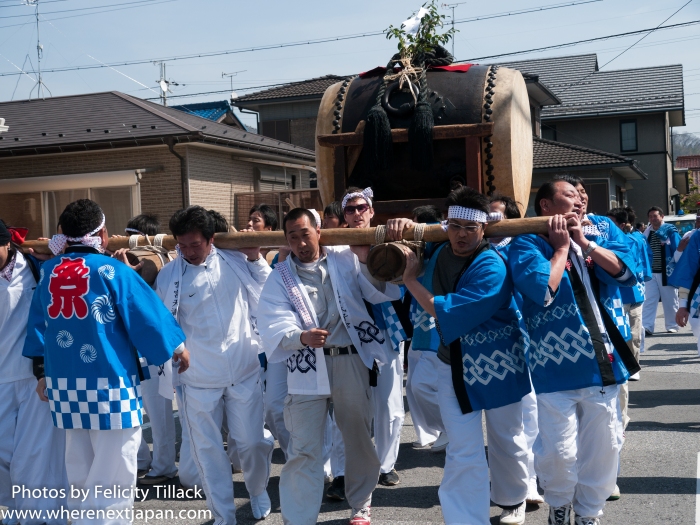The faint chanting of, “washai, washai” tipped me off that somewhere, nearby, a festival was going on. Mid-morning, Sunday, with a house to clean for visitors, a full load of clothes in the washing machine, and an afternoon busy with plans for a different festival, you would think I could resist the temptation.
But the taiko drum was louder than the spin cycle; I clipped on my camera and found the procession nearby.

The newly created character: Naruhira-chan, carried by local children
The hill by my house is home to at least 5 Shinto shrines, and a Buddhist temple. One of them, Hiratanarumiya Tenmangu (平田鳴宮天満宮), was holding its 春祭り, spring festival. Entranced by their bright blue happi vests and the huge, vermillion coloured cow they carried, I followed along, sometimes mixing into the group as the streets got more narrow. Nobody seemed to mind me joining in, and I learnt along the way that the cow was the new mascot for the shrine, (I have even found a blog showing pictures of the half finished Naruhira-chan being prepared as a surprise).

Some children carried one of two gleaming mikoshi.

Smaller participants were responsible for the gong.

The main event of course was the Taiko. 400 years old, and probably just as many kilos (or more!), young men were drafted in from the local university to help carry it.
We arrived at the first stop, where beers were handed out liberally and I was given a happi of my own. I asked some of my new friends about the festival, but many were uncertain of the exact details. For many, it was just a chance to celebrate spring, and involve their kids in a ritual running back centuries. Two other gaijin (non-Japanese) had joined in the festivities as well, helping to carry the massive taiko. One of them, a cheerful American, even had the proper tabi, traditional footwear, while most of the young Japanese men wore sneakers, and I was wearing crocs. Despite the lack of appropriate shoes, I was asked if I wanted to “challenge” and help carry the taiko.
They handed me a towel, and it was taiko toting time.

And we got to throw it in the air too! (Can you see my crocs?)
I don’t know really how much I helped carry the taiko. The men around me were very watchful, and careful not to let me shoulder too much of the weight, and though I got to carry it twice, they swapped me in and out for breathers. The towel helped a bit, especially at the time, though I wouldn’t think so in the following days as I relived those 5 minutes of carrying with every twitch in my back and shoulders.
The organisers and participants were so friendly and welcoming, inviting interested spectators and foreigners to join in the celebration. In many ways however, this is the only way that local festivals like this will survive, as many young, single people are either too busy or uninterested to join in. Families and older people represented the local community, but the numbers have dropped to the point that boys from a local university were conscripted to help carry the huge, heavy taiko.
I hope these traditions do continue, for many centuries to come, because there is nothing better than waking up one morning to the sounds of an hitherto unknown festival occurring down the street.

Thanks for the awesome day!

Great pictures and reportage! I too hope they keep up the traditions! I have never tried to carry a drum or mikoshi! Good for you!
LikeLike
Thanks Leah ^^ I was so full of adrenalin after I was shaking after. My husband thinks I’m a bit strange though, because he’s not so into the local festivals ><
LikeLike
I love this aspect of Japan, and like you I hope these traditions continue long into the future. I’m lucky enough to live in an area with traditional events such as o-Bon and danjiri-matsuri being passed on to the next generation.
LikeLike
That’s great to hear ^^
LikeLike
Matsuri is the Japanese word for “Festival.” In traditional Japanese culture, we have different festivals for different occasions and some of them are with shrines or temples, while others are secular.
LikeLike